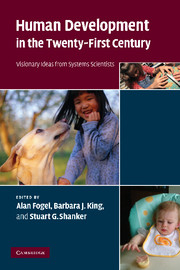Book contents
- Frontmatter
- Contents
- List of contributors
- Introduction: Why a dynamic systems approach to fostering human development?
- Part I Dynamic relationships between genetics and environments
- Part II The dynamic system of the child in the family
- Part III The dynamic system of the child in social and physical environment
- Part IV Dynamic systems approaches to mental health
- 17 A dynamic developmental model of mental health and mental illness
- 18 Dyadic microanalysis of mother–infant communication informs clinical practice
- 19 Current problems of Japanese youth: some possible pathways for alleviating these problems from the perspective of dynamic systems theory
- 20 A different way to help
- 21 Why do siblings often turn out very differently?
- 22 A dynamic systems approach to understanding family and peer relationships: implications for effective interventions with aggressive youth
- 23 Prenatal substance exposure and human development
- Part V Conclusions and outlook
- Index
- References
21 - Why do siblings often turn out very differently?
Published online by Cambridge University Press: 22 September 2009
- Frontmatter
- Contents
- List of contributors
- Introduction: Why a dynamic systems approach to fostering human development?
- Part I Dynamic relationships between genetics and environments
- Part II The dynamic system of the child in the family
- Part III The dynamic system of the child in social and physical environment
- Part IV Dynamic systems approaches to mental health
- 17 A dynamic developmental model of mental health and mental illness
- 18 Dyadic microanalysis of mother–infant communication informs clinical practice
- 19 Current problems of Japanese youth: some possible pathways for alleviating these problems from the perspective of dynamic systems theory
- 20 A different way to help
- 21 Why do siblings often turn out very differently?
- 22 A dynamic systems approach to understanding family and peer relationships: implications for effective interventions with aggressive youth
- 23 Prenatal substance exposure and human development
- Part V Conclusions and outlook
- Index
- References
Summary
No one has a definitive answer as to why the same parents often raise children that turn out very differently, but it happens time and again. I grew up in such a family. One of my brothers never “lifted off ” to function independently of my parents. Occasional forays towards independence invariably ended in some type of crash and burn. He would lose a job, get sick, or be terribly lonely. My parents would again take care of him. He was a source of great anguish for my family. My other two brothers and I coped and assumed adult responsibility more easily. How to understand this? My parents were good, hard-working people and dearly loved all of their children.
In my practice as a psychiatrist specializing in treating families, I routinely consult with parents who are having more difficulty raising one child than the others. The child is usually having some mixture of academic, behavioral, or health problems. Whether he is the oldest or the youngest child, the parents often say that he or she seems less mature, more insecure, more intense, more sensitive, or more dependent than their other children. They are worried and usually at their wits' end about how to help their son or daughter.
The differences between siblings are not always marked, but statistical studies show that significant disparities in the overall life adjustment of siblings are more the rule than the exception.
- Type
- Chapter
- Information
- Human Development in the Twenty-First CenturyVisionary Ideas from Systems Scientists, pp. 206 - 215Publisher: Cambridge University PressPrint publication year: 2007
References
- 2
- Cited by



